- Home
- Robert Goddard
Sight Unseen Page 2
Sight Unseen Read online
Page 2
Lucky her, thought Umber, as he took a deep breath of cold Czech air and launched his commentary with some loosely framed thoughts on the Prague Spring of 1968 and the Velvet Revolution of 1989. It was a well-worn theme. He was a historian, after all, albeit not as well qualified as Ivana had implied. He was on autopilot before they had even reached the Monument to the Victims of Communism.
And on autopilot he remained as the tour proceeded. They reached Old Town Square in good time to see the Astronomical Clock’s march-past of apostles when it struck the hour, crossed Charles Bridge, popped into and out of the Church of St Nicholas, then took the funicular railway (fare included in the price) up to Petrín Park. The snow was ankle-deep in the park, which slowed their progress, those inadequately clad and shod only now realizing what they had signed up for. Umber had allowed for this, however. Some deft abridgements during their visits to the Strahov Monastery and the Loreto had them at U Modré Merunky, halfway back down the hill to Prague Castle, more or less when Janoušek was expecting them.
The exact nature of the deal between Ivana and this less than glorious example of Czech innkeeping had never been disclosed to Umber. It was certainly not predicated on the quality of the food. The roast pork was gristly, the red cabbage vinegary and the dumplings unyielding. But no-one complained. Those at Umber’s table even praised the food. Perhaps they did not wish to hurt their host’s feelings. Umber could have told them, but did not, that Janoušek did not actually have any feelings on the subject that could be hurt.
The latecomer to the tour, Umber’s fellow-passenger from the number 24 tram, sat at a different table and said little to his companions. Removal of his woolly-hat revealed a bald head with a dusting of shaven white hair above his deeply lined brow, piercing blue eyes and hollow cheeks. He was a short, broad, bony man of sixty or seventy, whom nobody seemed eager to engage in small talk and who looked as if that suited him fine: he was nobody’s fool, his bearing proclaimed, and nobody’s favourite uncle either. His gaze appeared to be fixed throughout the meal on the back of David Umber’s head. But of that David Umber was unaware.
Lunch over, but already repeating on some of them, the group slithered down to the Castle in time for the two o’clock Changing of the Guard. This was followed by a circuit of St Vitus’s Cathedral before they made their way to the Royal Palace for Umber’s account of the famous Defenestration of 1618 that sparked off the Thirty Years War. He was mildly worried at this stage by the chance that someone might ask him to explain the whys and wherefores of that long-ago conflict. But the moment passed with questionless ease. They made a gingerly descent of Old Castle Steps, crossed back over the river and entered the Jewish Quarter.
Three synagogues and one cemetery later, they returned to Old Town Square, where the tour ended at the birthplace of Franz Kafka. Umber cracked his customary joke about hoping nobody had found the day too much of a trial. There were more smiles than laughs and a few expressions of thanks, extending in one case to a (very) modest tip. Then the group dispersed.
It was late afternoon now and growing colder. Umber hurried round to the Jolly Brolly nerve centre, two second-floor rooms about halfway between Old Town Square and the Prague branch of Tesco, where he planned to buy his dinner.
There was no sign of Ivana in the office. She had left it in the languid care of Marek, her youthful and, in Umber’s view, useless assistant. Marek was sitting with his feet on the desk, smoking a Camel cigarette and texting a friend when Umber walked in. Marek nodded a greeting and slid a small, square manilla envelope across the desk. Umber pocketed the envelope, returned his umbrella to the stack in the corner and made to leave.
At which point he noticed that morning’s edition of Annonce – the classifieds paper with the most comprehensive accommodation listings in Prague – lying discarded in the waste bin. He fished it out and glanced enquiringly at Marek.
‘Prosím,’ said Marek, with a sarcastic smirk.
Umber exited, checking the contents of the envelope as he descended the rickety stairs. All the money was there. But all, in this case, was not a lot.
Back on the street, solvent if scarcely flush, Umber decided that Tesco could wait. Jolly Brolly HQ’s proximity to U Zlatého Tygra, the Old Town’s most famous drinking establishment, verged on the unreasonable. At this hour he could be sure of a seat, which, after foot-slogging round the city all day, he needed almost as much as a beer.
U Zlatého Tygra – the Golden Tiger – was its normal soothing, smoky self. Umber settled himself at the table screened by the pub’s trophy cabinet, next to the window on which the eponymous tiger frolicked in stained-glass abandon. Half a litre of cellar-cooled Pilsner was swiftly delivered to him and his tab initiated with a slash of the server’s pen. Umber took a deep gulp of beer, then unfolded Annonce and commenced a less than hopeful search for attractive and affordable alternatives to his present abode.
But his search never even reached the APARTMENTS TO RENT page. A bulky figure rounded the trophy cabinet at that moment and assumed a looming stance above him. Umber looked up and, to his surprise, recognized the newcomer, or at any rate recognized his outfit of maroon parka and matching woolly-hat. He was one of the tour party.
‘Hello,’ said Umber. ‘What brings you here?’
‘You do.’ The man pulled off his hat and unwound his scarf, fixing Umber with a steely blue gaze.
It might have been the quality of the gaze that clinched it. Or it might have been the flat, faintly menacing tone of voice. Either way, recognition – true recognition – dawned now on Umber.
‘I don’t believe it,’ he murmured. Which was true. He did not believe it.
‘You’ll have to,’ the other man said. Which was also true. It was not a matter of choice. It never had been.
It had begun at Avebury. But it had not ended there.
TWO
‘CHIEF INSPECTOR SHARP.’ Even as he spoke the words, Umber realized that the man he knew as Detective Chief Inspector George Sharp of the Wiltshire Constabulary could by no stretch of the imagination still be a serving police officer, even though his appearance had not been much altered by the passage of years. He must have retired long since. ‘Here on holiday?’
‘Let’s get one thing straight from the off.’ Sharp discarded his parka and sat down. ‘This isn’t a chance meeting. I didn’t sign up for that tour today and suddenly think, swipe me, isn’t our guide that David Umber I remember from the Avebury case?’
‘No?’
‘I followed you from your flat this morning. I just didn’t know I was going to have to wait this long for a word in private.’
‘You call this private?’
Sharp glanced around. ‘It’ll do.’ Then his gaze returned to Umber. ‘And you can drop the “Chief Inspector”. I was put out to grass years ago.’
‘I suppose you must have been.’
At that moment Sharp’s beer arrived. He eyed it suspiciously. ‘Don’t they ask what you want here?’
‘It’s taken for granted. Beer or nothing.’
Sharp took a gulp and grimaced. ‘Not a patch on Bass.’
‘What do you want … Mr Sharp?’ Umber tried to drain the snappishness out of his voice as he finished the question.
‘What do you think I want?’
‘After more than twenty years? Search me.’
‘It’s not that hard to work out.’
They looked at each other for several seconds in uncongenial silence. Then Umber said, ‘I thought your people reckoned they had the truth when they put Brian Radd away.’
‘My people? I’ll give you that. But not me. I never swallowed Radd’s story. Not for a second.’
‘Didn’t you?’
‘Did you?’
More silence, blanking out for the pair the burble and bustle of the pub. Then Umber shook his head. ‘Of course not.’
‘There you are, then.’
‘You still haven’t told me why you’re here. Or why you’ve been tailing m
e. There was no need for the gumshoe routine, anyway. You could just have called round. Or phoned me without leaving England.’
‘I like to know what I’m dealing with.’
‘And what are you dealing with?’
‘Unfinished business.’
‘For Christ’s sake.’ Umber was beginning to feel angry, now the shock of Sharp’s appearance had faded. ‘You’re not serious, are you?’
‘Why do you think I’m here?’
‘Bored by retirement. Writing your memoirs. God knows.’
Sharp smiled. ‘Memoirs. That’s a good idea. One I’ve thought about, matter of fact.’
‘Really?’
‘I handled quite a few big cases over the years. Mostly with the Met, before I transferred to Wiltshire. I thought it’d be a quieter life down there. Didn’t turn out to be, though.’
‘Bad luck.’
‘Wrong place, wrong time. Like you, I suppose.’
‘Not quite like me.’
‘No. Maybe not. But you know what I mean.’
‘I still don’t, actually.’
‘I put a lot of evil people behind bars. There were a good few more I couldn’t pin anything on, but I knew what they were guilty of. As far as murder goes, there wasn’t one I didn’t crack. Not one. Except …’
‘Avebury.’
‘You said it.’
‘Well, you’ll just have to live with that, won’t you? Like the rest of us.’
‘Will I?’
Umber sat back as his by now empty glass was collected, letting slip the chance to decline a refill and take his leave. He looked at Sharp, steadily and disbelievingly. ‘What are you on – a conscience trip?’
‘Sort of. I should have got to the bottom of it. And I didn’t. It may not be as hard to bear as the what-ifs and why-didn’t-Is of those who were there at the time, of course, but—’
‘What the hell do you mean by that?’
‘Well, you must have said to yourself often enough over the years, “If I’d reacted faster, if I’d moved more quickly … I might have saved the girl.”’ Sharp broke off as Umber’s second beer arrived, then went on: ‘Don’t tell me you never have.’
‘All right. I won’t tell you.’
‘She’d be thirty this year. If she’d lived.’
Umber raised a hand to his brow and closed his eyes for a second. ‘Oh, Christ.’
‘What’s the matter?’
‘Nothing.’ Umber opened his eyes. ‘Nothing at all.’
‘Is that the sort of thing Sally used to say?’
There was another wordless interval. Umber swallowed some beer and looked towards the window. ‘I don’t have to listen to this.’
‘I only realized you’d married her when I heard about her suicide. The change of surname. It was a surprise, I don’t mind admitting. How did that happen – you and her getting together?’
‘None of your business.’
‘Orphans of the storm, I suppose. But maybe the storm never quite blew itself out.’
Umber looked back at him. ‘You don’t know what you’re talking about.’
‘Put me right, then.’
‘It wasn’t—’
‘Suicide? Not according to the coroner, no. But that’s what it sounded like to me. And to you, I’ll bet.’
This was too close to the bone – and to the truth. Umber stood up and grabbed his tab. He would pay at the bar and go. He would leave and have done with it. ‘I’ve had enough,’ he declared.
‘I can make trouble for you, Mr Umber.’
That stopped Umber in his tracks. He looked down at Sharp. ‘What did you say?’
‘I can call in a few favours if I need to and have your affairs given close attention. Uncomfortably close. Your tax status springs to mind. Always a promising place to start where expats are concerned. Catch my drift?’
‘You’re bluffing.’
‘Maybe. Maybe not. Why take the risk? All I’m asking you to do is to sit down and answer a few questions.’ Sharp smiled thinly. ‘Help me with my enquiries. As the saying goes.’
Umber hesitated. Why was Sharp so determined to put him through this? It was all so pointless, so pitifully late in the day. He remembered Sharp as a bluff, no-nonsense policeman. There had been no hint of obsession. What was he trying to achieve?
‘Sit down.’
With a sigh, Umber obeyed. ‘I could do without going over it all again,’ he said, almost to himself. ‘I really could.’
‘So could I.’
‘Then spare us both.’
‘Not in a position to, I’m afraid.’
‘Why not?’
‘All in good time. Besides, I’m not convinced you don’t know why.’
‘You’re making no sense … Mr Sharp.’
‘All right. Let’s stick for the moment to the facts. Those we can agree on. Let’s just … run through a few of them.’
‘Must we?’
It was unclear if Sharp had even heard the question. ‘Avebury: Monday, twenty-seventh July, 1981,’ he said, Umber’s heart sinking at the implacable declaration of place and date. ‘Two days before the Royal Wedding, incidentally, which denied us a lot of valuable publicity in the early stages of the inquiry. Anyway, that’s the where and when. Sally Wilkinson, nanny to the Hall family, takes the Halls’ three children – Jeremy, aged ten, Miranda, seven, and Tamsin, two – to Avebury for fresh air and exercise. Also because Jeremy’s been badgering her to go on account of a school project that sparked his interest in stone circles. They walk around. They look at the stones. Everything’s very normal, very peaceful. But there’s a white van parked in Green Street. A man gets out of the van, grabs little Tamsin while Sally’s back is turned and drives off with her. Or is driven. We’ll come back to that point later.’
‘You’re not telling me anything I don’t already know,’ Umber pointed out wearily.
‘Tamsin’s sister runs into the road, presumably to try and stop the van,’ Sharp pressed on. ‘She is struck. And killed. Outright.’ He paused, as if encouraging Umber to interrupt again. But there was no interruption. ‘Witnesses,’ he continued. ‘Other than Sally and Jeremy, we have three. Percy Nevinson, a local man with a comprehensive knowledge of the circle. Not exactly level-headed, though. Tells me he’s working on a theory that Martians built Avebury – and Silbury Hill. That puts him in the nutter category in my book. Then there’s Donald Collingwood, who drives through the village as all this is happening, but doesn’t stop and only comes forward three weeks later. Explains he was afraid of losing his licence on account of his dodgy eyesight. As a result of said eyesight, he isn’t too sure what he saw or where the van went. Finally, there’s—’
‘Me.’
‘That’s right. David Umber. Sitting outside the Red Lion. With a ringside view of the whole thing.’
‘I told you everything I knew at the time. Every single thing I could remember.’
‘Which didn’t amount to much. And the same goes for the rest. Confusion is the top and tail of it. No registration number for the van. No decent description of the abductor. No nothing. Result: one dead girl; one missing girl; one traumatized boy; one guilt-ridden nanny; a devastated family; a hamstrung inquiry; an unsolved murder. Maybe two unsolved murders. What happened to Tamsin … we have no idea.’
‘You have no idea. Officially, it’s down to Radd. That’s still so, isn’t it?’
‘It’s a grey area. He was never formally charged. But he did confess. The whole thing had a … desk-clearing feel about it to me.’
‘What do you mean?’
‘Nine years after the event, and only a few months after I’ve taken early retirement, Brian Radd, child murderer, suddenly adds Tamsin Hall to his admitted list of victims just before he goes into court certain of a life sentence. Says he drove her off, did God knows what to her, then strangled her and buried the body in Savernake Forest. Can’t remember, even vaguely, which part of the forest, so a search is out of the question. They�
�d have found bugger all after nine years anyway. Radd’s from Reading, so it’s a Thames Valley case, but Hollins, my successor in Wiltshire – a by-the-book time-server if ever there was one – goes with the flow and puts out a statement saying they’re not looking for anyone else in connection with the crime. I smell a rat. Radd’s confession gets the murder and the abduction off the books. Nobody cares whether it would stand up in court – whether it’s true.’
‘Sally cared.’
‘Were you married by then?’
‘No. Together. But not married. That came later.’ Later as in too late, Umber thought but did not say. The marriage had been an attempt to deny that their relationship was falling apart. Its disintegration would have been easier to accept if the reason had been something banal like infidelity or incompatibility. But no. The reason was Avebury, 27 July 1981. That was always the reason. ‘The police signing up to Radd’s version of events really got to her, you know. She saw the bloke who grabbed Tamsin bundle her into the back of the van and climb in after her. Then the van took off. But Radd claimed to have been alone. No accomplice. Therefore Sally must have been mistaken. She’d been blamed for not taking better care of Tamsin. Now she was being told her account of what happened wasn’t credible. She never got over that.’
‘It would have been different if I’d still been on the Force.’
‘Pity you didn’t tell her so.’
Sharp scowled into his beer. ‘My old Chief Super asked me not to rock the boat.’
‘And you were a loyal cop, even in retirement.’
‘I should have contacted Sally and assured her I still believed her.’
‘Yes. You should.’
‘Is that what made you do it?’
Umber was wrong-footed by the question. He had seemed to have Sharp on the defensive. It had not lasted long. ‘Do what?’
Sharp stared at him long and hard. The server replaced their empty glasses with full ones. Sharp held the stare.
‘What are you talking about?’ pressed Umber.

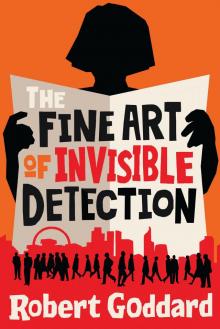 The Fine Art of Invisible Detection
The Fine Art of Invisible Detection One False Move
One False Move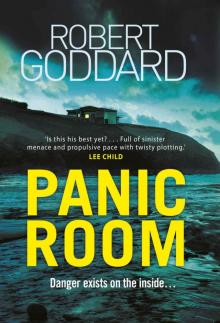 Panic Room
Panic Room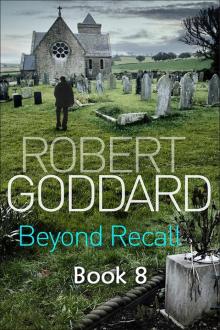 Beyond Recall
Beyond Recall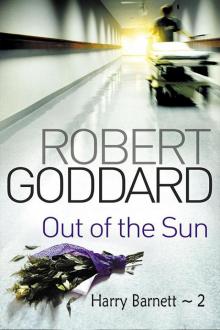 Out of the Sun
Out of the Sun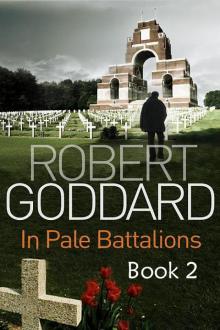 In Pale Battalions - Retail
In Pale Battalions - Retail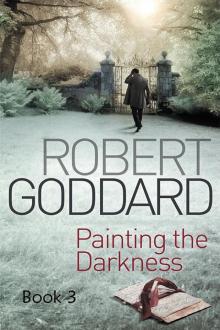 Painting The Darkness - Retail
Painting The Darkness - Retail The Corners of the Globe
The Corners of the Globe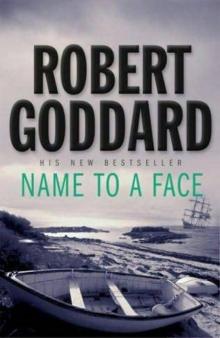 Name To a Face
Name To a Face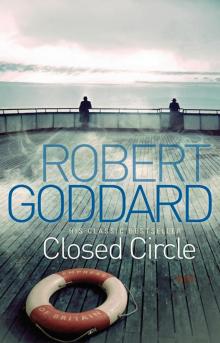 Closed Circle
Closed Circle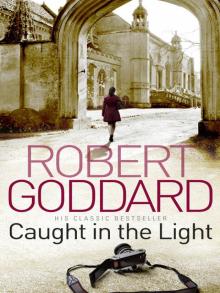 Caught In the Light
Caught In the Light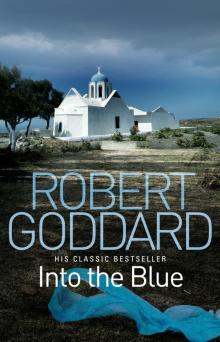 Into the Blue
Into the Blue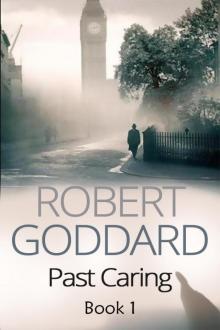 Past Caring - Retail
Past Caring - Retail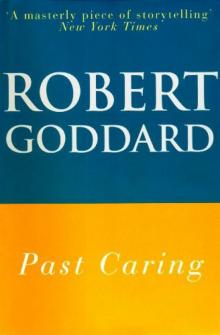 Past Caring
Past Caring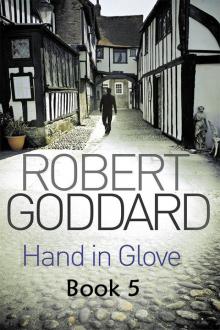 Hand In Glove - Retail
Hand In Glove - Retail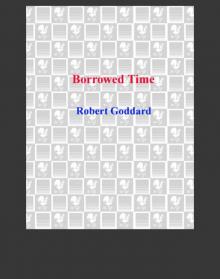 Borrowed Time
Borrowed Time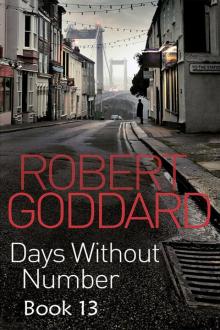 Days Without Number
Days Without Number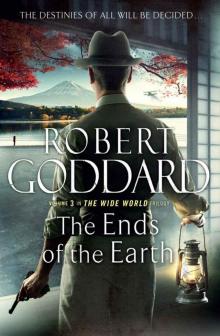 James Maxted 03 The Ends of the Earth
James Maxted 03 The Ends of the Earth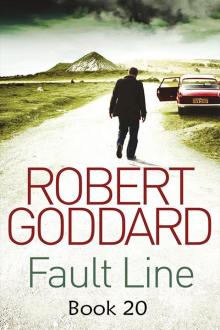 Fault Line - Retail
Fault Line - Retail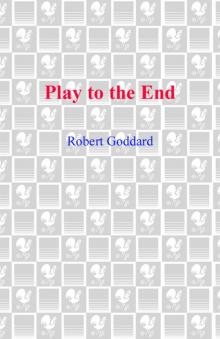 Play to the End
Play to the End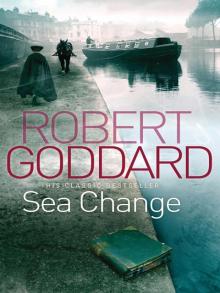 Sea Change
Sea Change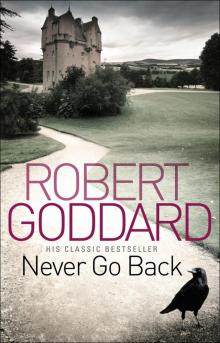 Never Go Back
Never Go Back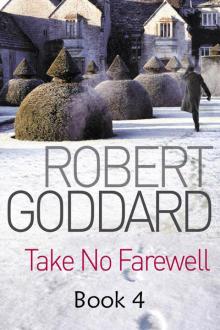 Take No Farewell - Retail
Take No Farewell - Retail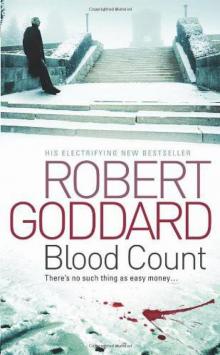 Blood Count
Blood Count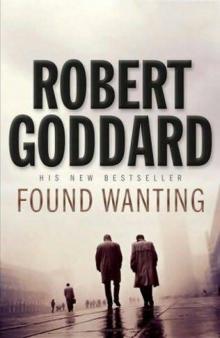 Found Wanting
Found Wanting Sight Unseen
Sight Unseen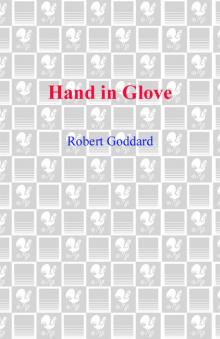 Hand in Glove
Hand in Glove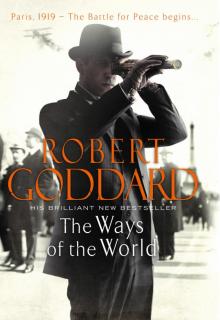 The Ways of the World
The Ways of the World